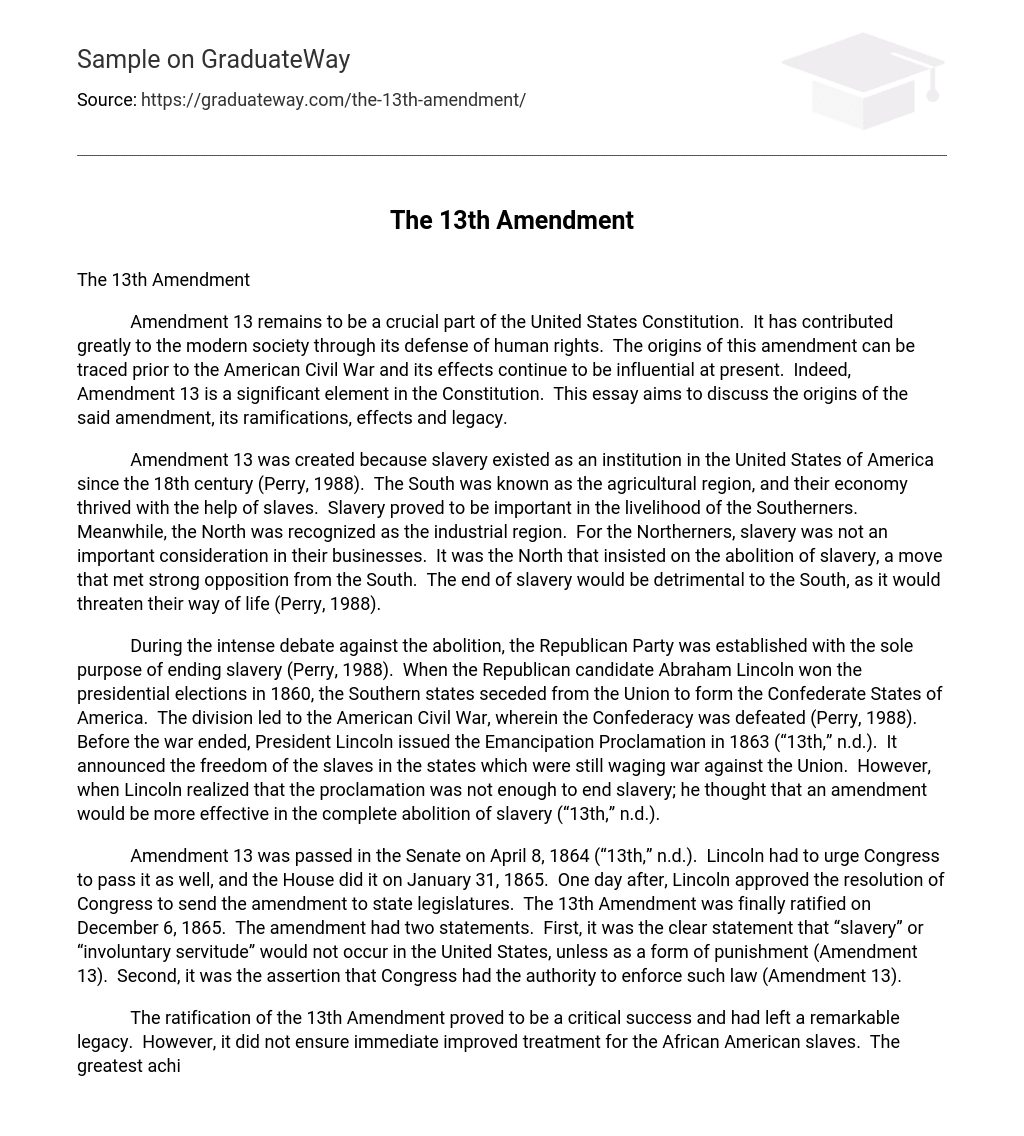Amendment 13 remains to be a crucial part of the United States Constitution. It has contributed greatly to the modern society through its defense of human rights. The origins of this amendment can be traced prior to the American Civil War and its effects continue to be influential at present. Indeed, Amendment 13 is a significant element in the Constitution. This essay aims to discuss the origins of the said amendment, its ramifications, effects and legacy.
Amendment 13 was created because slavery existed as an institution in the United States of America since the 18th century (Perry, 1988). The South was known as the agricultural region, and their economy thrived with the help of slaves. Slavery proved to be important in the livelihood of the Southerners. Meanwhile, the North was recognized as the industrial region. For the Northerners, slavery was not an important consideration in their businesses. It was the North that insisted on the abolition of slavery, a move that met strong opposition from the South. The end of slavery would be detrimental to the South, as it would threaten their way of life (Perry, 1988).
During the intense debate against the abolition, the Republican Party was established with the sole purpose of ending slavery (Perry, 1988). When the Republican candidate Abraham Lincoln won the presidential elections in 1860, the Southern states seceded from the Union to form the Confederate States of America. The division led to the American Civil War, wherein the Confederacy was defeated (Perry, 1988). Before the war ended, President Lincoln issued the Emancipation Proclamation in 1863 (“13th,” n.d.). It announced the freedom of the slaves in the states which were still waging war against the Union. However, when Lincoln realized that the proclamation was not enough to end slavery; he thought that an amendment would be more effective in the complete abolition of slavery (“13th,” n.d.).
Amendment 13 was passed in the Senate on April 8, 1864 (“13th,” n.d.). Lincoln had to urge Congress to pass it as well, and the House did it on January 31, 1865. One day after, Lincoln approved the resolution of Congress to send the amendment to state legislatures. The 13th Amendment was finally ratified on December 6, 1865. The amendment had two statements. First, it was the clear statement that “slavery” or “involuntary servitude” would not occur in the United States, unless as a form of punishment (Amendment 13). Second, it was the assertion that Congress had the authority to enforce such law (Amendment 13).
The ratification of the 13th Amendment proved to be a critical success and had left a remarkable legacy. However, it did not ensure immediate improved treatment for the African American slaves. The greatest achievement of the amendment was the abolition of slavery. Slavery as an institution was removed completely, and it will go down in history for restoring the civil rights of the black community in America (“13th,” n.d.). Nonetheless, the better life promised by the amendment to African Americans was initially true in theory but false in practice. The unforeseen ramification of the 13th Amendment was the failure to guarantee the freedom of the slaves. The administration after Lincoln’s was not as dedicated in the objective of black freedom (Thomas, n.d.). There were laws created to keep the African Americans poor and unemployed. Though slavery was already prohibited, some were still enslaved by newly created restrictions (Thomas, n.d.).
The 13th Amendment may not have guaranteed a complete improvement of the lives of the African Americans. After the amendment was ratified, there were still much to be changed in the way the blacks were treated in the community. However, the amendment was the first step to social reform. Without it, African Americans would still be in bondage at present. The best legacy that the amendment provided was an opportunity for the black people to exercise their freedom. It was not an absolute freedom, but it surely paved the way for other freedoms to be enjoyed. This was what made the 13th Amendment very important in the U.S. Constitution.
References
Amendment 13. The U.S. Constitution Online. Retrieved February 11, 2009, from http://www.usconstitution.net/const.html
13th amendment to the U.S. constitution: abolition to slavery (1865). Our Documents. Retrieved February 11, 2009, from http://www.ourdocuments.gov/doc.php?flash=true&doc=40
Perry, M. (1989). A History of the World. Massachusetts: Houghton Mifflin.
Thomas, S. (n.d.). Life after the 13th amendment. Frederick Douglass. Retrieved February 11, 2009, from http://www.history.rochester.edu/class/douglass/part5.html





